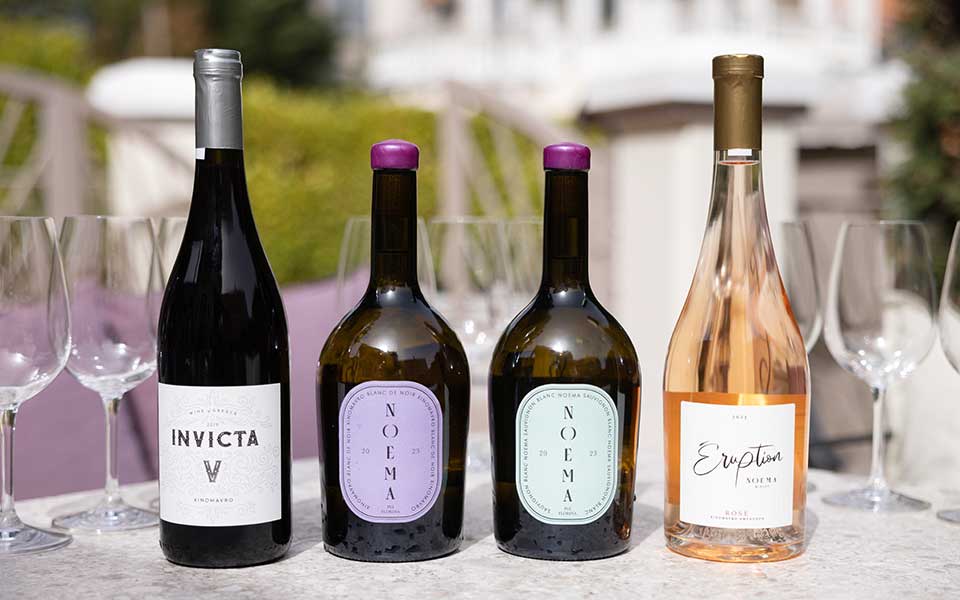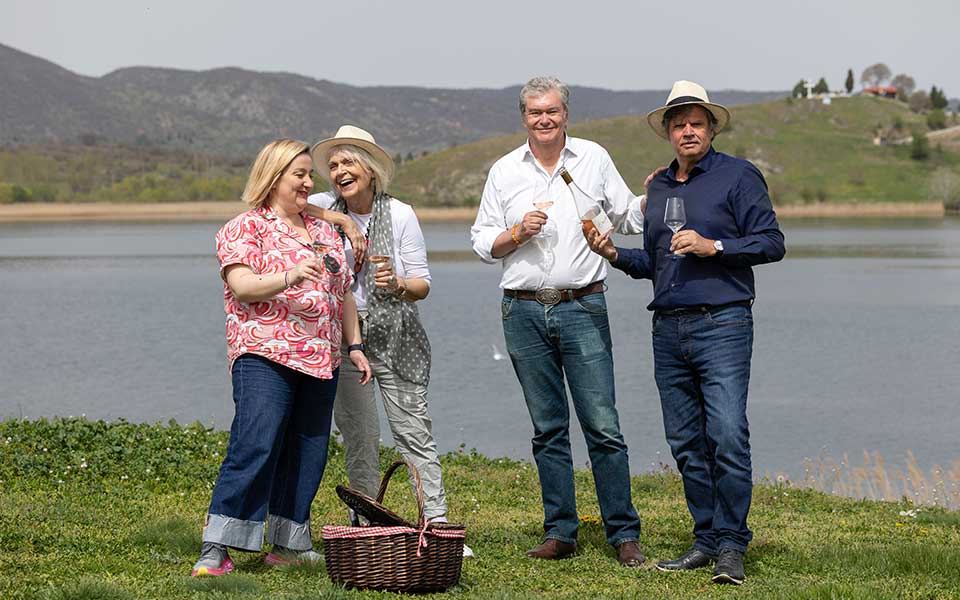On Kefalonia, Winemakers Adapt to Rising Temperatures
Climate change brings water scarcity and...

Meropi Papadopoulou and David Witting.
© Alexandros Avramidis
How and why an American businessman with no family ties to Greece found himself in the uplands of Amyntaio producing wines was intriguing to me. So, one sunny spring day I met with David Wittig on the shores of Lake Zazaris – which together with Lake Cheimaditida and Lake Petron forms the beautiful lake region of Amyntaio – to try wines and walk along the trails that brought a man of the corporate world to Greece to produce some of the area’s most delectable wines.
In order to trace the origins of Noema Winery, we have to go back a dozen years, to New York and to Father Alexandros Karloutsos, a prominent figure of Greek Orthodoxy and Hellenism on the other side of the Atlantic Ocean and a person considered by many to be the most important Greek priest in the world! Father Alex encouraged his good friend David Wittig to visit Greece, and it was during a family vacation there that Wittig was approached by the firm Euroconsultants with an interesting investment opportunity. “In 2014, Greece was the black sheep of the international financial sector. It was considered by nearly everyone as the worst place to invest in. But I never follow the herd and I thought to myself, ‘Why not?’”, Wittig said.
So, the ever-bold businessman found himself with one foot in Athens. At this point, however, he wasn’t thinking of winemaking as an option – he was himself only familiar with Assyrtiko wine from Santorini. The true credit for his eventual foray into the wine business should go to his son Davis, who initiated his father into the local varieties and convinced him that there was a market for Greek wines in the US.
Father and son founded their Amyntaio winery together. “In the beginning, I was quite skeptical”, David Wittig told me, “But now I am very enthusiastic. My son returned to the US for the Christmas holidays after being away for a year. He fell in love, got married – today, he’s the CFO of Corporate Banking at Wells Fargo – and I suddenly found myself in sole charge of the winery. I’m still Euroconsultants’ biggest foreign investor and consultant, but I find myself becoming more and more engrossed in winemaking. I’ve been a part of many companies in my career, but winemaking is something different! The spirit of cooperation between producers doesn’t exist in any other sector, and I believe it is this spirit that contributes to the international success of Greek wines.”

© Alexandros Avramidis
I wondered why, of all of Greece’s wine regions, Wittig chose Amyntaio. “Father Alex played a role in this decision, too”, he told me. “He introduced me to Periklis Drakos, a former director of exports at the Tsantalis wine company, whom I convinced to join us from the beginning. Periklis believes that Amyntaio will be Greece’s next big wine region, and he’s right. We have a cool, continental climate with 1,600 GDD, or Growing Degree Days, a complicated calculation based on temperatures that estimates the growth and development of crops during the growing season, and relatively high elevations up to 750 meters. This results in the production of a lighter Xinomavro grape. The wines that are produced in this exceptional microclimate are the alter ego to Naoussa’s wines. [Editor’s note: Naoussa is the other wine area famed for Xinomavro production.] Amyntaio Xinomavro wines stand out because they combine the dynamism of the variety’s structure with finesse and a strong aromatic expression.”
Noema focuses on the production of Xinomavro wines: red, rosé, and the more delectable blanc de noir which I have personally tried. “Greek varieties are what make Greek wines”, Wittig said. “International consumers are looking for authenticity. I don’t see why we need to try to convince them to try a Greek Chardonnay. Those of us who are fortunate enough to live here know about the exceptional quality of our local varieties. But it’s a challenge to convince the rest of the world of it. Regardless of the challenge, I’m optimistic. I believe that the continuous increase in Greece’s tourism, through which more and more people are discovering the allure of Greek wine, will help.”

Left o right: Kiki Panagiotou, Meropi Papadopoulou, David Wittig, Periklis Drakos.
© Alexandros Avramidis
The team at Noema have very interesting ideas regarding exports. “Our international markets are growing, mainly in areas where there is a strong Greek presence,” Wittig said. “But we have to look beyond Greece’s diaspora. We have to sell to everyone. We have to strengthen the Greek wine category in shops all over the world, with good wines at competitive prices. We are working on a business venture that we call Wine Cellars. Small wineries, with quality wines, that want to export their products abroad will over time make up the attractive export portfolio that we want to create. I believe that our grape variety and the unique nature of the region, together with the commitment and the compelling stories of the local winemakers, are all competitive advantages that will sway international consumers.”
Our discussion, which began at the lake, concluded at Aeroino, a beautiful wine bar in Florina run by the oenophile Giannis Soubasis. Sitting in the bar’s cool courtyard, enjoying a drink with the winery’s Kyriaki Panagiotou and Periklis Drakos, I asked Wittig if, given the choice, he would do it all over again regarding the winery. “Without a second thought!” he replied at once. “I would definitely do it again. Of course, I’ve made a lot of mistakes along the way but, if you want to succeed, you have to be willing to learn.”
Noema Winery produces three wines from Xinomavro grapes: Invicta: a red, aromatic wine with a velvety texture that leaves an intense freshness on the palate and a lasting aftertaste; Eruption: an explosively aromatic rosé wine that is balanced, complex and attractive to the palate; and Blanc de noir Xinomavro, an elegant and delectable white wine (produced from red grapes) that is full of the characteristic aromas of the Xinomavro grape.
Climate change brings water scarcity and...
The Thessaloniki-born winemaker welcomes us to...
Why not try a brief getaway...
This storied rarity, grown nearly exclusively...